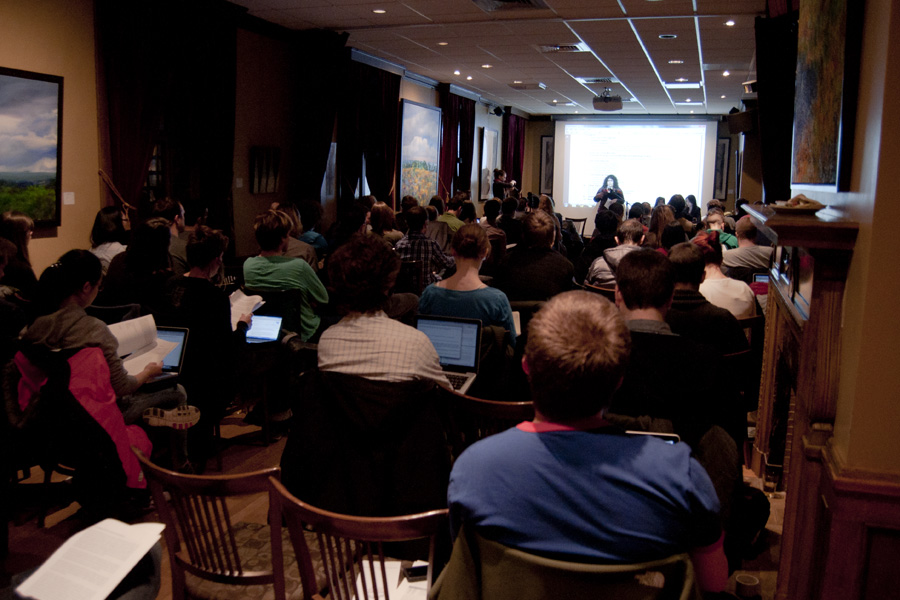The Post-Graduate Students’ Society (PGSS) of McGill University has publically taken the stance that Quebec universities are under-funded. Last Wednesday, PGSS Council passed a motion calling for the Society to take this position in preparation for the upcoming Quebec Education Summit scheduled for Feb. 25 and 26.
According to the motion, PGSS also supports the Fédération étudiante universitaire du Québec (FEUQ)’s call for further investigation into how university money is spent. It passed after a heated debate amongst Council members and representatives of the FEUQ who attended the meeting.
Participants who spoke on behalf of FEUQ said they do not believe there is enough evidence to prove that Quebec universities are underfunded, and that university administrations are responsible for mismanaging the money they receive from the provincial government. FEUQ speakers were concerned that the PGSS motion means the Society is complying with university administrations and their association, known as Conférence des recteurs et des principaux des universités du Québec (CREPUQ).
“I want to point out … that the underfunding that the CREPUQ talks about is a comparison between Quebec and the rest of Canada,” Marc-André Legault, president of the graduate student council at the FEUQ, said. “It doesn’t specify what are the needs of the university .… What we advocate at the FEUQ is that we have to know what are the needs of universities. We are not going to give blank checks to the rectors.”
The PGSS decided to hold its own investigation into university financing after receiving many requests from within and outside McGill to take the stance that universities in Quebec are underfunded, according to PGSS Secretary-General Jonathan Mooney. He named both the McGill administration—which is a member of CREPUQ—and FEUQ as groups that wanted PGSS to take an informed stance on the issue.
“Obviously, FEUQ lobbied us to stick with their position that the studies demonstrating underfunding are flawed and not to take the position that underfunding is a reality,” he said.
PGSS asked Conor Farrell, a researcher for the Society with a background in statistics, to look at the different reports from CREPUQ, FEUQ, and other post-secondary education organizations to determine whether or not Quebec universities are underfunded. Farrell produced a 24-page document that concluded that universities in Quebec need more money to function properly. After having received the report, the executive drafted the motion for Council.
“The first part of this motion is to say that, ‘yes, there is evidence that Quebec universities are underfunded,’” Mooney said. “But, that doesn’t mean you just give the money to the rectors or the principals to let them do whatever they want with it. There needs to be an accountability mechanism system in place, so we are supporting the FEUQ’s motion to create a [Commission for the Evaluation of Universities in Quebec] CEUQ.”
CEUQ would be an independent body that would hold rectors accountable for the spending of public money.
Mooney expressed concern when his colleagues showed scepticism over the report’s findings.
“It’s not just CREPUQ who is saying [that universities are underfunded],” Mooney said. “[When] the Council of Ontario Universities … [was] trying to make a case that Ontario universities are underfunded, they did [a] comparative analysis. Quebec came in dead last among operating grants given from the government.”
“This idea that we don’t need money is absurd,” he continued. “It’s all being done for political reasons.”
Leah Freeman, a graduate student in McGill’s School of Social Work and FEUQ vice-president of graduate student affairs, spoke out against the PGSS’s motion on behalf of FEUQ at Wednesday’s meeting.
“We will always advocate for more money to universities,” she said. “We are not asking you to give us permission to not ask for more. We are asking you to give us permission to get universities’ funding where it needs to go. Right now … we don’t know where the money is going.”
Freeman—along with the other FEUQ representatives, had no voting rights—as she is not a member of Council. Ultimately, the motion passed with an overwhelming majority in favour.








